4.第四讲 意识形态
意识形态讲解
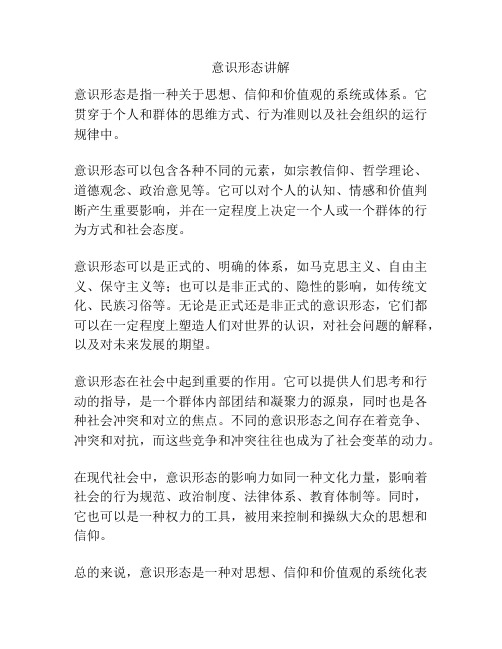
意识形态讲解
意识形态是指一种关于思想、信仰和价值观的系统或体系。
它贯穿于个人和群体的思维方式、行为准则以及社会组织的运行规律中。
意识形态可以包含各种不同的元素,如宗教信仰、哲学理论、道德观念、政治意见等。
它可以对个人的认知、情感和价值判断产生重要影响,并在一定程度上决定一个人或一个群体的行为方式和社会态度。
意识形态可以是正式的、明确的体系,如马克思主义、自由主义、保守主义等;也可以是非正式的、隐性的影响,如传统文化、民族习俗等。
无论是正式还是非正式的意识形态,它们都可以在一定程度上塑造人们对世界的认识,对社会问题的解释,以及对未来发展的期望。
意识形态在社会中起到重要的作用。
它可以提供人们思考和行动的指导,是一个群体内部团结和凝聚力的源泉,同时也是各种社会冲突和对立的焦点。
不同的意识形态之间存在着竞争、冲突和对抗,而这些竞争和冲突往往也成为了社会变革的动力。
在现代社会中,意识形态的影响力如同一种文化力量,影响着社会的行为规范、政治制度、法律体系、教育体制等。
同时,它也可以是一种权力的工具,被用来控制和操纵大众的思想和信仰。
总的来说,意识形态是一种对思想、信仰和价值观的系统化表
达,它在个人和社会中具有重要地位和作用。
不同的意识形态可以引领不同的行为方式和社会发展方向,因此,对于理解和分析社会现象和历史变迁,认识和研究意识形态是非常重要的。
第四讲德意志意识形态——唯物史观汇总
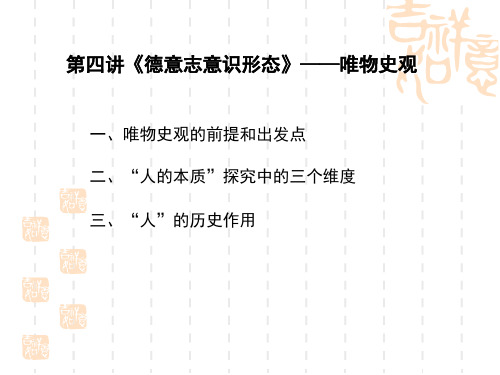
(二)机械的“是”与历史的“应当”
在文本中,“社会存在决定意识”这个命题中,社会存在 并不是外在于人并且只按照自身固有规律发展的客观物质存在, 它就是人的社会存在、人在社会中的存在、人的实际生活过程。
在《德意志意识形态》中说:“意识在任何时候都只能 是被意识到了的存在,而人们的存在就是他们的实际生活过 程。
那些发展着自己的物质生产和物质交往的人们,在改变 着自己的这个现实的同时也改变着自己的思维和思维的产物。 不是意识决定生活,而是生活决定意识。
▪
恩格斯在《卡尔·马克思〈政治经济学批判。第一分册
▪
恩格斯在《卡尔·马克思〈政治经济学批判。第一分册
〉》中指出:“在历史上出现的一切社会关系和国家关系,
一切宗教制度和法律制度,一切理论观点,只有理解了每一
个与之相适应的时代的物质生活条件,并且从这些物质生活
条件中被引申出来的时候,才能理解。”
4、社会存在与社会意识的辩证关系
(一)教科书中的社会存在与社会意识的辩证关系 (二)文本中的社会存在与社会意识的辩证关系
▪
——《共产党宣言》
2、社会存在
(一)教科书中的社会存在 (二)文本中的社会存在
(一)教科书中的“社会存在”
也称社会物质生活条件,是社会生活的物质方 面。包括物质生活资料的生产及生产方式、地理环 境和人口因素。
(二)文本中的“社会存在”
他在《〈政治经济学批判〉序言》中说:“不是人们的 意识决定人们的存在,相反,是人们的社会存在决定人们的 意识”。
▪
恩格斯在《卡尔·马克思:“在历史上出现的一切社会关系和国家
第四讲德意志意识形态——唯物史观
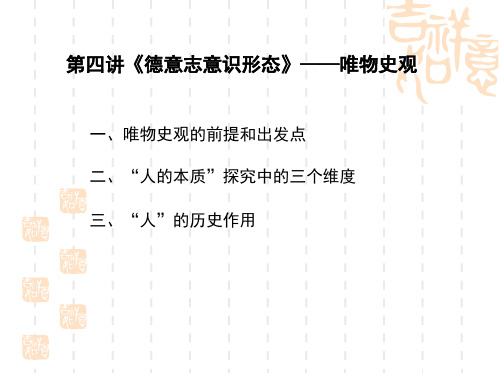
恩格斯说:“马克思首先是一个革命家。以某种方式 参加推翻资本主义社会及其所建立的国家制度的事业,参加 赖有他才第一次意识到本身地位和要求,意识到本身解放条 件的现代无产阶级的解放事业,———这实际上就是他毕生 的使命” 。
马克思自己也强调:“哲学家们只是用不同的方式解释 世界,而问题在于改变世界”;
▪
——《共产党宣言》
2、社会存在
(一)教科书中的社会存在 (二)文本中的社会存在
(一)教科书中的“社会存在”
也称社会物质生活条件,是社会生活的物质方 面。包括物质生活资料的生产及生产方式、地理环 境和人口因素。
(二)文本中的“社会存在”
他在《〈政治经济学批判〉序言》中说:“不是人们的 意识决定人们的存在,相反,是人们的社会存在决定人们的 意识”。
西。因此第一个历史活动就是生产满足这些需要的资料,
即生产物质生活本身。
▪
已经得到满足的第一个需要本身、满足需要的活动和
已经获得的为满足需要而用的工具又引起新的需要,而这
种新的需要的产生是第一个历史活动。
▪
▪
——《德意志意识形态》
▪
马克思指出,“需要的发展是人的本质力量的新的
证明和人的本质的新不断改变和发展的历史。离开了
人的需要,人的一切实践活动和一切社会关系都将不复
存在。
▪
海德格尔本人也惊叹马克思思想的深刻性,他在《人
道主义的书信》中这样写道:“因为马克思在体会到异化
的时候深入到历史的本质性的一度中去了,所以马克思主
义关于历史的观点比其余的历史学优越。但因为胡塞尔没
▪
恩格斯在《卡尔·马克思〈政治经济学批判。第一分册
〉》中指出:“在历史上出现的一切社会关系和国家关系,
第四讲《德意志意识形态》

可能的原因是:(1 可能的原因是:(1)从这一思路出发的概述已经完成; (2)感到从这一思路出发进行的概括与后面的系统表述 在逻辑上不一致,需要重新写一个“开头”。 第二个开头(即第五手稿)是不同于第一个开头的独立 理论表述,这一表述是从历史进程的具体发展来说明新世 界观的。 这两个开头可能是从两个不同的视角来阐述新哲学的, 前者是共时性视角,即社会结构性视角,体现的是从现象 道本质的哲学逻辑分析的思路;后者则是历时性视角,即 社会历史的过程性视角,用三种社会形态的具体发展过程 来进行经济学的理论说明。体现的是政治经济学的分析思 路。
18
视了人作为个体的存在,认为只有“我”才是唯一真实的 最高存在,宣扬个人主义、无政府主义。 马克思认为,施特劳斯“实体”、鲍威尔的“自我意 识”、施蒂纳的“唯一者”以及费尔巴哈的“类”,都不 过是黑格尔 哲学中“绝对理念”的别名,都摆脱不掉神 秘主义,因为他们总是抽象地谈论问题。 2、青年黑格尔派只局限于对宗教观念的批判( P23第2 段):他们认为宗教统治着一切,是社会弊端的总根源, ):他们认为宗教统治着一切,是社会弊端的总根源, 他们将宗教的范围夸大、扩大了。 3、 P23—24第3、4段:从“宗教、概念、普遍的东西 从“宗教、概念、普遍的东西 统治着现存世界”的观点出发,青年黑格尔派把批判的任 务归为改变人们的意识,他们实际上是将对现实的批判归 结为对天国的批判,颠倒了意识与现实的关系。
4
(三)文本的重要地位
1、1844年的《手稿》是马克思借助费尔巴哈的人本学 1844年的《手稿》 和黑格尔以来的异化理论,特别是赫斯的经济异化思想, 对资本主义社会现实和政治经济学进行批判的一次尝试。 费尔巴哈人本学中的内在唯心主义此时尚未被马克思发现, 更谈不上超越。费尔巴哈的人本学在这里是被马克思作为 试图超越蒲鲁东、赫斯等人政治经济学的一个新的批判路 径来使用的。 2、1845年的《提纲》,是马克思拟定的批判德国古典 1845年的《提纲》 哲学,特别是批判费尔巴哈哲学的一个提纲。在《提纲》 哲学,特别是批判费尔巴哈哲学的一个提纲。在《提纲》 中,马克思通过对费尔巴哈的批判,清算了自己的哲学信 仰,实现了对费尔巴哈的超越,从而实现了思想的重大转 折:从隐性唯心主义过渡到了唯物主义;恩格斯因此而把 它看作是新世界观的第一次萌芽。但由于各种原因,马克 思并没有将《提纲》 思并没有将《提纲》写作出来。
第四讲 《关于费尔巴哈的提纲》与《德意志意识形态》(节选《费尔巴哈章》部分)

《提纲》的第六条:批判费尔巴哈在谈论人的 本质问题时,忽略了对人的本质作历史的、实践的 考察,不理解“人的本质在其现实性上是一切社会 关系的总和”。关于《提纲》的这一条,学界通常 把它理解为实践的人本质论。 《提纲》的第七条:上承第六条,指出费尔巴 哈哲学的对象、题材,如它所观察的宗教情感、他 所分析的抽象个人,并不是思想自身所面对的超历 史的课题,而是历史的产物,即“实际上是属于一 定的社会形式的。” 《提纲》的第八条:指出“全部社会生活在本 质上是实践的”,实践才是人类社会形成的关键前 提。而宗教思想和唯心主义哲学自身的社会历史根 源,本身就是人类实践因其历史性而形成的特定方 式。
是创造和改变“物质生活条件”的活动,因而它是在外的、 感性对象性活动。因此,“这些个人把自己和动物区别开 来的第一个历史行动不在于他们有思想,而在于他们开始 生产自己的生活资料。”历史不是思想史,而首先是生产 史。 三是以“历史的自然”取代“抽象的物质自然”,是 历史唯物主义的本体论原则。历史之真正的本体论根据既 已确立,就不能再把历史与自然对立起来,应该以现实个 人的生产史相联系起来考察。马克思和恩格斯在批判费尔 巴哈的抽象的感性本体论时,重点指出了他不能理解在人 的感性活动中建构的“历史的自然”既是自然科学的真正 对象与材料,又是人类社会状况演变的真实根源,从而必 定重新陷入唯心主义;“他没有看到,他周围的感性世界 决不是某种开天辟地以来就直接存在的、始终如一的东西, 而是工业和社会状况的产物,是历史的产物,是世世代代 活动的结果”;“这种活动、这种连续不断的感性活动和
2024意识形态宣讲内容

2024意识形态宣讲内容一、引言在当今时代,意识形态的斗争依然激烈,对于一个国家、一个民族来说,保持正确的意识形态是至关重要的。
2024年,我们将迎来一系列重要的历史节点,我们必须以高度的责任感和使命感,深入开展意识形态工作,确保国家长治久安、人民安居乐业。
二、意识形态工作的重要性首先,我们要认识到意识形态工作的重要性。
意识形态是人们对于世界的认知和价值观念的反映,它对于人们的思想和行为具有重要的引导作用。
只有保持正确的意识形态,才能确保我们的事业始终沿着正确的方向前进。
同时,意识形态工作也是维护国家安全和社会稳定的重要保障。
在当今世界,各种思想观念相互交织、碰撞,如果不能有效地开展意识形态工作,就可能导致思想混乱、社会动荡。
三、当前意识形态领域的挑战与应对当前,我国意识形态领域面临着诸多挑战。
随着全球化的深入发展,西方价值观不断渗透,一些不良思想观念也乘虚而入。
同时,随着信息技术的发展,网络成为意识形态斗争的主战场,各种虚假信息、谣言、恶意攻击层出不穷。
这些问题的存在,不仅会影响个人的价值观念,也会影响到国家的安全和社会稳定。
因此,我们必须采取有效的措施应对这些挑战。
具体而言:1. 加强思想引领:我们要始终坚持马克思主义在意识形态领域的指导地位,引导人们树立正确的世界观、人生观和价值观。
同时,要积极推进社会主义核心价值观的培育和践行,使其成为全体人民的共同价值追求。
2. 强化阵地管理:对于各类媒体平台,我们要加强管理,确保其传播的信息真实、客观、公正。
对于网络谣言、恶意攻击等行为,要依法打击,维护网络空间的清朗。
3. 提高防范意识:我们要加强对于西方价值观的警惕性,防止其渗透和侵蚀。
同时,要提高防范意识,对于各种不良思想观念要保持清醒的认识和高度的警觉。
4. 推进文化交流:我们要加强与世界各国的文化交流,增进相互了解和友谊。
通过文化交流,可以更好地展示我国的优秀传统文化和现代文明成果,增强国际话语权和影响力。
意识形态专题学习

意识形态专题学习1. 意识形态的定义意识形态,指的是一种理论、观点或信仰体系,它在政治、经济、文化等领域起着指导作用,为一个社会团体、政党或国家体系提供了价值观和行动指南。
意识形态是形成一个群体认同意识和共同价值观的基础。
2. 意识形态的作用意识形态在社会中起到了重要的指导作用。
它通过教育和宣传等方式,将一种思想体系传递给人们,让人们在这种基础上思考和行动。
意识形态不仅对个体产生影响,更重要的是影响整个社会的思维方式和社会发展。
意识形态的作用可以从以下几个方面来看:(1)对个体的价值观和行为产生影响。
意识形态的核心是价值观,它可以约束人们的行为和思考方式,从而影响到个体的人生轨迹。
(2)对社会的思维方式产生影响。
意识形态不仅改变个体的思维方式,更重要的是改变整个社会的思维方式,从而影响到社会的发展轨迹。
(3)对民众政治行为产生影响。
政治意识形态包含了政治制度、组织形式、道德标准等,它能够影响到民众的政治行为。
(4)对文化生态的影响。
不同的意识形态会影响到不同文化的形成与模式,从而影响到整个文化生态的进程。
3. 典型意识形态(1)马克思主义马克思主义起源于19世纪中期的欧洲,并逐渐传播到世界各地。
它是一种旨在揭示资本主义社会规律、促进无产阶级革命的理论体系。
马克思主义认为,资本主义是一个阶级分化和阶级斗争的社会形态,只有通过无产阶级专政,才能消除资本主义、建立社会主义和共产主义制度。
(2)民族主义民族主义是一种强调民族特有性、民族优越性和民族利益的思想体系。
它在传统文化、民族传统、民族精神以及民族文化在政治、经济、社会等方面具有的优势上建立。
民族主义认为,每个国家的民族集体应该追求自我独立、自主发展和自身利益最大化。
(3)自由主义自由主义源于17世纪的西方现代文化运动,是一种强调个人自由、平等和尊重的哲学体系。
自由主义主张保护个人权利、鼓励市场竞争、推进自由贸易、支持个人自由选择和异端思想的兴起。
第四讲意识形态

马克思和曼海姆被誉为现代意识形态理论的奠基人。
马克思在《德意志意识形态》中赋予“意识形态”
概念以新的涵义。马克思认为,意识形态是“与物 质前提相联系的物质生活过程的必然升华物”,表 现为道德、宗教、形而上学等一系列的意识形式。 作为社会意识的组成部分,意识形态是人们对物质 生活过程,对一定的社会政治经济制度的系统、概 括的反映,不过这种反映是以“颠倒”的形式表现 出来。按照马克思主义的观点,各种意识形态理论 总是以抽象的理论形式体现特定的阶级地位及利益, 是特定阶级从自身的地位和利益出发对特定社会关 系的认识所形成的思想理论和观点的体系。
新自由主义:
自资产阶级革命起的几百年间,自由主义始
终是资本主义国家的主流政治思想。自由主 义始终坚持个人主义,维护资本主义秩序。 这一思潮由于在意识形态领域和社会政治生 活中所起的重大作用和产生的深刻影响,依 然被西方各国作为社会的主流思想,并被大 多数国家确立为制定国策和统治方略的理论 基础。
民主社会主义:
二战后,在西方的一些国家,社会党或社会民主党 取得执政地位,推行一种有别于传统资本主义和现 存社会主义的改良主义的“第三条道路”。 民主社会主义的基本信念是:忠诚于民主,尊重奠 定在法律上的秩序,拒绝使用暴力作为政治斗争的 工具,政治应形成于广大范围的讨论中的要求。民
主社会主义把社会主义冠于民主的前提,主张民主 不能局限于政治领域,还应包括经济、社会和国际 民主,而成为一个“体系”。
当代著名的自由主义者J· 格雷在他的《自由主义》 一书中,对自由主义四个特征的归纳最具代表性。 他提出:“自由主义的第一个特征是个人主义,它 宣告对任何社会集体的否定,将个人独立的精神置 于首位;第二个特征是平等主义,认为人们在精神 上都有同等的地位,否认人与人之间在法律地位或 政治地位上的不同;第三个特征是普遍主义,依据 特殊历史群体和文化形式的重要性,承认群体的道 德体系;第四个特征是社会向善主义,认为所有的 社会群体和政治安诽都是趋向进步的。
意识形态专题培训资料

意识形态专题培训资料第一章:意识形态的定义和意义1.1 意识形态的概念意识形态是指一套关于社会、政治、经济、文化等问题的理论体系和思想观点,它可以对社会行为、政治制度和价值取向产生重要影响。
1.2 意识形态的作用意识形态对于社会和个体都具有重要的影响力。
它可以引导人们的行为,塑造人们的思想观念,影响社会的发展方向和政治体制的建立。
第二章:意识形态的分类2.1 政治意识形态政治意识形态指的是关于政治制度、权力分配和公共事务的思想观点。
例如,民主主义、社会主义和法西斯主义等就是不同的政治意识形态。
2.2 经济意识形态经济意识形态是关于经济制度、生产关系和财富分配的思想观点。
例如,资本主义和社会主义就是不同的经济意识形态。
2.3 文化意识形态文化意识形态是关于文化认同、价值观念和文化传承的思想观点。
例如,宗教信仰、国家认同和民族文化等都属于文化意识形态的范畴。
第三章:意识形态的起源和演变3.1 意识形态的起源意识形态的起源可以追溯到人类社会的早期。
随着社会的发展,人们开始思考社会问题并形成不同的思想观点和价值体系,从而形成了意识形态。
3.2 意识形态的演变意识形态在不同的历史时期发生了重大的变化。
从古代的宗教信仰到现代的政治思潮,意识形态一直在不断演变和发展,与社会的进步和变革密切相关。
第四章:意识形态与社会变革4.1 意识形态的推动作用意识形态在社会变革中起到了重要的推动作用。
它可以激发人们的社会责任感和行动意识,促进社会的进步和发展。
4.2 意识形态的反作用意识形态也可以作为社会变革的阻碍。
当意识形态僵化和僵硬化时,就可能阻碍社会的发展和变革。
第五章:意识形态与个体行为5.1 意识形态对行为的引导个体的行为往往受到意识形态的引导。
一个人的意识形态会影响他的价值观念和行为准则,塑造他的特定行为方式和思维方式。
5.2 意识形态与个人选择个体在面临选择时,往往会受到意识形态的影响。
一个人的意识形态会影响他对不同选择的偏好和判断,从而影响他的行为决策。
第四讲 意识形态 第一节 意识形态的基本类型(各种“主义”)

◇ 意识形态的变化与社会存在的变化不完全同步:进步 与落后,法治与人治,资产阶级政治思想与资产阶级革 命
11
◇ 意识形态的发展具有历史的继承性:“如果说我看得 比别人更远些,那是因为我站在巨人的肩膀上”(牛顿)
7
六、民族主义爱国心、民族自豪感 政治:有自己的国家 “左派”
8
第二节 意识形态的含义与特征
一、意识形态的概念
马克思的意识形态定义
◇ 它是对历史唯心主义的否定和揭示 ◇ 它是一种对社会存在的系统解释 ◇ 它在总体上是一类确定的文化
曼海姆对两种范围意识形态的区分:“思想方式”
15
三、意识形态变革与经济增长的关系
意识形态的特征与经济增长:马克思主义与社会 主义市场经济,全面性、灵活性、合理性、稳定 性、包容性 意识形态变革的滞后性及其影响
◇ 压制创新:部分老干部反对开放改革 ◇ 破坏正在变革团体存在的合法性:中国改革中的“补
天派”与“改天派” ◇ 造成团体成员的分裂,阻挠集体行动的进行:中国知
5
四、民主社会主义
“第三条道路”:资本主义与社会主义,“去其 糟粕,取其精华”,“中庸”
“中派”
◇ 左派:国家全面干预、高税收、高政府开支、完全福利 国家
◇ 右派:个人主义和自由市场经济能够解决所有问题
◇ “第三条道路”:机会而不是财富的平等和社会包容、
自律式的自由、摒弃无责任的权利、摒弃无民主的权威、
世界主义的多元论、哲学上的保守主义、以中间阶层为
社会主流与基础、不断的再民主化过程、建立适应全球
化趋势的结构机制、发挥充满活力的公民社会的作用、
意识形态培训课件

意识形态培训课件一、引言意识形态是指对于思想、价值观和信仰等方面的集中体现,它直接影响个体和群体的意识和行为。
在今天复杂多样的社会背景下,意识形态对于个体和社会的发展起着重要的作用。
本课程旨在通过系统的培训,帮助学员加深对意识形态的认识,掌握相关的理论知识和分析方法,提高对意识形态的辨析和应对能力。
二、意识形态的概念意识形态可以理解为一种社会上独立的思想体系,它通过各种文化、宣传、教育等手段对人的思维和价值观进行塑造和影响。
意识形态不仅仅是对于国家政治思想的宣传和统一,也体现在社会生活的方方面面。
不同的社会群体和个体会形成不同的意识形态,它们通过教育、宣传、媒体等方式影响人们的思维方式和行为准则。
三、意识形态的影响意识形态对个体和社会的影响十分重要,它会对人们的认知、价值观、态度等方面产生深远的影响。
以下是意识形态的几个重要影响:1. 形塑个体认同意识形态可以塑造个体对于特定思想、价值观和信仰的认同感。
通过不同的意识形态引导和教育,人们会形成对于某种思想体系的认同感,进而影响他们的行为和选择。
2. 改变社会结构意识形态对社会结构的变化起着重要的作用。
通过宣传和教育,一种新的意识形态可以被引入社会,从而改变社会结构和社会组织的形态。
3. 影响决策过程意识形态会直接影响个体和群体的决策过程。
不同的意识形态会导致不同的思维方式和行为准则,从而影响人们在决策过程中的选择和判断。
4. 形成社会氛围意识形态还会在社会中形成一种特定的氛围和价值观念。
通过宣传和教育,特定的意识形态可以传播到整个社会,形成共识和社会文化。
四、意识形态分析方法为了更好地理解和分析意识形态,以下是几种常用的分析方法:1. 文本分析法通过对相关文本材料(如宣传、教育手册)进行分析和解读,揭示其中所体现的意识形态要素,分析其宣传手法和隐含的信息。
2. 社会调查法通过对社会群体的调查和观察,了解其意识形态的来源、发展和变化,揭示其中的规律和趋势,为意识形态的研究提供实证数据。
关于意识形态的培训资料

关于意识形态的培训资料第一章:引言意识形态是人类社会中的重要概念,它涉及到对于世界观、价值观和观念体系的认知和塑造。
在当今社会,各种意识形态在不同国家和地区存在并发展着,对社会、个体和群体产生着深远的影响。
本培训资料旨在通过探索意识形态的概念、历史和影响,帮助培训对象更好地理解和应对意识形态的影响。
第二章:意识形态的定义与特征2.1 意识形态的定义意识形态是指一种总体的、系统的、基本的观念模式,包括人们对于世界的认知方式、对事物的评价和判断、对行动准则的制定以及对社会关系的构建等。
2.2 意识形态的特征- 总体性:意识形态呈现出一种整体性和一致性的特征,其各个要素相互关联、相互依存。
- 系统性:意识形态是一个有机的体系,其中的观念、价值和行动准则相互衔接和相互支持。
- 基本性:意识形态作为一种基本的观念模式,能够指导人们在具体问题上做出判断和决策。
第三章:意识形态的历史演变3.1 古代意识形态古代社会中的意识形态主要受到宗教、神话和传统价值观念的影响。
例如,古埃及社会的意识形态依托于他们的宗教信仰,并以尊崇法老为核心。
古希腊的意识形态则以理性和自由为基本,强调人的理性能力和个体价值。
3.2 近代意识形态近代社会中的意识形态受到科学、理性和民主等思想的影响。
启蒙时代的意识形态主张科学与理性,强调人权和自由平等。
而在现代社会,以社会主义和资本主义为代表的两种意识形态在世界范围内竞争激烈。
第四章:意识形态的影响和作用4.1 意识形态的社会影响不同的意识形态对社会产生深远的影响,它们影响着社会结构、经济制度、政治体系以及文化价值观念等方面。
社会主义意识形态力图实现公有制和社会平等,而资本主义意识形态则强调市场自由竞争和个人权利。
4.2 意识形态的个体影响意识形态对个体的认知、价值观和行为都产生着重要的影响。
儿童时期的教育和社会环境塑造了我们的意识形态,而成年后,个体可以通过自我思考和经验来调整和改变自己的意识形态。
第4讲 电影与意识形态

一、什么是意识形态
1、马克思:用于掩盖资产阶级本质属性的虚构的、歪 曲的、具有欺骗性的思想与意识的面具。 2、列宁:所有阶级意志和意识的呈现。 3、阿尔杜塞:主体对主体与世界之关系的想像性表 达。强调意识形态的想像性。 4、齐泽克:主体用来认识社会与群体必须经过的一种 “幻象”,属于误认的范畴、属于物质性的存在。 关 于误认的事例如《俄狄浦斯王》、《“青年男女的 厄 运”》、《皇帝的新装》Leabharlann 四、影片分析《看上去很美》
1、影片的主题是什么? 2、影片中的方枪枪作为主体是怎样一步一步被规训的 3、影片中以形象化的方式呈现了两种常见的规训方式, 分别是什么? 4、影片有哪些象征性的元素? 5、影片最后,意识形态的效果对方枪枪是否产生影响? 6、导演对意识形态持怎样的态度?我们应该怎么看待? 7、影片使用了怎样的意识形态批判策略?
二、精神分析理论对意识形态认知的拓展
1、为什么需要精神分析 2、弗洛伊德理论(三种重要理论) 3、拉康理论(十二个关键词)
三、电影与意识形态
1、任何电影都有意识形态立场,一切电影都是政治的。 举例:《手机》、《三峡好人》、《色戒》 2、电影通过特有的叙事和修辞来表达意识形态含义 3、电影的意识形态表达策略 (1)直接的意识形态批判:《阳光灿烂》 (2)意识形态寓言化 (3)政治反讽:《光荣的愤怒》 (4)政治伦理化:《大兵瑞恩》《集结号》 (5)伦理历史化:《手机》 (6)意识形态性别化:《颐和园》、《钢琴课》
第四讲德意志意识形态选读-资料

同年6月,在莱比锡出版了《维干德季刊》1845 年第2卷,其中有费尔巴哈的文章《就<唯一者 及其所有物>谈<基督教的本质>》。在这篇文章 中,费尔巴哈针对施蒂纳的批评,强调了他的哲 学并没有否定个人,他的“感性”也就是个性真 实的内容。在这篇文章的最后,费氏第一次声称 自己是“共产主义者”。
同期还有古•尤利乌斯的《看得见的教派与看不 见的教派之争或批判对批判的批判所作的批判》
第二章 《德意志意识形态》选读
《德意志意识形态》是马克思主义的新世界观第 一次系统而具体的阐发,在马克思主义发展史上 占有极为重要的地位。
第一节 写作背景和文本构成 一、写作背景 1845年2月马克思来到布鲁塞尔,将主要精力投
入到政治经济学研究中去。
此时的德国思想界发生了下列事情:1844年底, 施蒂纳(卡斯帕尔•施米特,1806年生,无政府 主义思想家)发表《唯一者及其所有物》。 1845年6月,莫泽斯•赫斯(1812-1875,最早转 向空想共产主义的青年黑格尔主义者,终其一生
鲍威尔指责马克思恩格斯和赫期在用类压迫个性 (自我意识)。施蒂纳也发表文章《施蒂纳的批 评家们》,这是他对批评《唯一者及其所有物》 一书的回答。他区别分析了费尔巴哈、鲍威尔和 赫斯等人的观点。其中,赫斯、马克思和恩格斯 被视为“现实的社会主义”和“神圣的社会主义” 的主要代表。
这时,马克思的思想基础已经不是哲学伦理逻辑, 而是是社会历史特别是经济发展的现实生活本身。 这时他已经写完了《关于费尔巴哈的提纲》。针 对德国哲学界的情况,他与恩格斯重新回到哲学 面前。一方面通过自我反思和批判,搞清问题, 清算从前的哲学信仰。二是全面建构新世界观的 理论逻辑,以便彻底将自己与“德意志意识形态” 区别开来。
意识形态专题培训内容
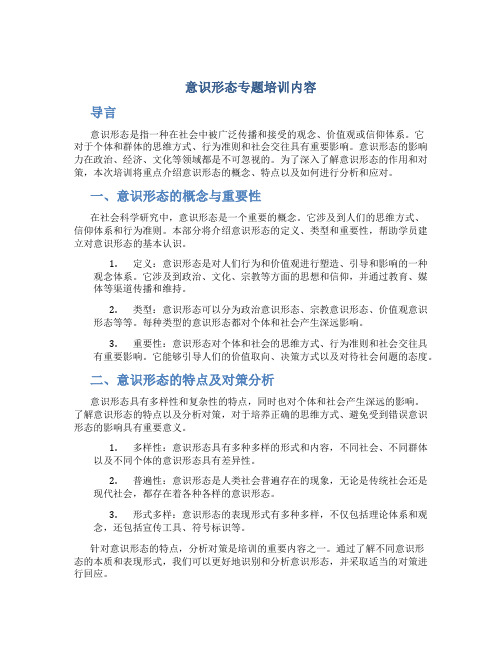
意识形态专题培训内容导言意识形态是指一种在社会中被广泛传播和接受的观念、价值观或信仰体系。
它对于个体和群体的思维方式、行为准则和社会交往具有重要影响。
意识形态的影响力在政治、经济、文化等领域都是不可忽视的。
为了深入了解意识形态的作用和对策,本次培训将重点介绍意识形态的概念、特点以及如何进行分析和应对。
一、意识形态的概念与重要性在社会科学研究中,意识形态是一个重要的概念。
它涉及到人们的思维方式、信仰体系和行为准则。
本部分将介绍意识形态的定义、类型和重要性,帮助学员建立对意识形态的基本认识。
1.定义:意识形态是对人们行为和价值观进行塑造、引导和影响的一种观念体系。
它涉及到政治、文化、宗教等方面的思想和信仰,并通过教育、媒体等渠道传播和维持。
2.类型:意识形态可以分为政治意识形态、宗教意识形态、价值观意识形态等等。
每种类型的意识形态都对个体和社会产生深远影响。
3.重要性:意识形态对个体和社会的思维方式、行为准则和社会交往具有重要影响。
它能够引导人们的价值取向、决策方式以及对待社会问题的态度。
二、意识形态的特点及对策分析意识形态具有多样性和复杂性的特点,同时也对个体和社会产生深远的影响。
了解意识形态的特点以及分析对策,对于培养正确的思维方式、避免受到错误意识形态的影响具有重要意义。
1.多样性:意识形态具有多种多样的形式和内容,不同社会、不同群体以及不同个体的意识形态具有差异性。
2.普遍性:意识形态是人类社会普遍存在的现象,无论是传统社会还是现代社会,都存在着各种各样的意识形态。
3.形式多样:意识形态的表现形式有多种多样,不仅包括理论体系和观念,还包括宣传工具、符号标识等。
针对意识形态的特点,分析对策是培训的重要内容之一。
通过了解不同意识形态的本质和表现形式,我们可以更好地识别和分析意识形态,并采取适当的对策进行回应。
三、意识形态分析方法和工具意识形态的分析是培训的核心内容之一。
本部分将介绍几种常用的意识形态分析方法和工具,帮助学员掌握有效的分析技巧。
意识形态教育课件带讲稿
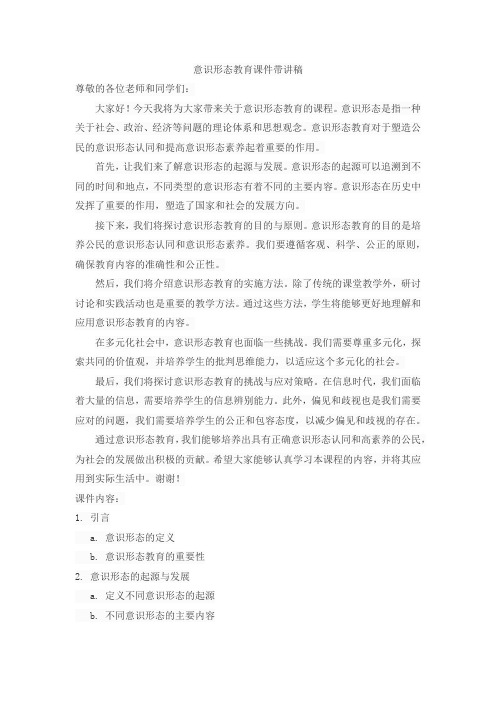
意识形态教育课件带讲稿尊敬的各位老师和同学们:大家好!今天我将为大家带来关于意识形态教育的课程。
意识形态是指一种关于社会、政治、经济等问题的理论体系和思想观念。
意识形态教育对于塑造公民的意识形态认同和提高意识形态素养起着重要的作用。
首先,让我们来了解意识形态的起源与发展。
意识形态的起源可以追溯到不同的时间和地点,不同类型的意识形态有着不同的主要内容。
意识形态在历史中发挥了重要的作用,塑造了国家和社会的发展方向。
接下来,我们将探讨意识形态教育的目的与原则。
意识形态教育的目的是培养公民的意识形态认同和意识形态素养。
我们要遵循客观、科学、公正的原则,确保教育内容的准确性和公正性。
然后,我们将介绍意识形态教育的实施方法。
除了传统的课堂教学外,研讨讨论和实践活动也是重要的教学方法。
通过这些方法,学生将能够更好地理解和应用意识形态教育的内容。
在多元化社会中,意识形态教育也面临一些挑战。
我们需要尊重多元化,探索共同的价值观,并培养学生的批判思维能力,以适应这个多元化的社会。
最后,我们将探讨意识形态教育的挑战与应对策略。
在信息时代,我们面临着大量的信息,需要培养学生的信息辨别能力。
此外,偏见和歧视也是我们需要应对的问题,我们需要培养学生的公正和包容态度,以减少偏见和歧视的存在。
通过意识形态教育,我们能够培养出具有正确意识形态认同和高素养的公民,为社会的发展做出积极的贡献。
希望大家能够认真学习本课程的内容,并将其应用到实际生活中。
谢谢!课件内容:1. 引言a. 意识形态的定义b. 意识形态教育的重要性2. 意识形态的起源与发展a. 定义不同意识形态的起源b. 不同意识形态的主要内容c. 意识形态在历史中的重要作用3. 意识形态教育的目的与原则a. 培养公民的意识形态认同b. 培养公民的意识形态素养c. 遵循客观、科学、公正的原则4. 意识形态教育的实施方法a. 课堂教学b. 研讨讨论c. 实践活动5. 意识形态教育与多元化社会a. 尊重多元化b. 探索共同价值观c. 培养公民的批判思维6. 意识形态教育的挑战与应对策略a. 信息时代的挑战b. 偏见与歧视的应对策略c. 培养学生的自主思考能力。
意识形态培训课件

意识形态培训课件意识形态培训课件意识形态是指一套关于社会、政治、文化等方面的基本观念、价值观和信念体系。
它对个体和社会具有重要的影响力,能够塑造人们的思维方式和行为准则。
在不同的社会和历史背景下,意识形态的内容和表达形式各不相同。
因此,意识形态的培训课件应当具备多样化的内容和灵活的教学方法,以满足不同群体的需求。
一、意识形态的概念和历史演变在开展意识形态培训之前,首先需要明确意识形态的概念和其在历史上的演变过程。
可以从哲学、社会学、政治学等多个学科角度进行解析,引导学员了解不同意识形态对社会的影响和作用。
二、意识形态的分类与特点意识形态的分类主要包括宗教意识形态、政治意识形态、经济意识形态等。
通过对各种意识形态的特点和核心价值观的分析,可以帮助学员理解不同意识形态的本质和特点,以及它们对社会和个体的影响。
三、意识形态与社会发展的关系意识形态与社会发展密切相关,它既受制于社会的变革,也能够引导和塑造社会的发展方向。
在这一部分,可以通过案例分析或历史事件的回顾,探讨不同意识形态对社会变革和发展的影响,并引导学员思考意识形态与社会进步之间的关系。
四、意识形态与个体认同的建构每个人都有自己的意识形态,它是个体认同的重要组成部分。
在这一部分,可以通过小组讨论、个案分析等方式,引导学员思考个体的意识形态是如何形成的,以及它对个体行为和价值观的影响。
五、意识形态的传播与宣传意识形态的传播和宣传是塑造社会意识的重要手段。
通过对媒体、教育、文化等领域的分析,可以帮助学员了解意识形态的传播途径和方式,以及它们对社会舆论和思潮的影响。
六、意识形态的冲突与和解不同意识形态之间的冲突是社会发展的常态,如何处理这些冲突成为一个重要问题。
在这一部分,可以通过案例分析或角色扮演的方式,引导学员思考如何在不同意识形态之间寻求和解和共识,以实现社会的和谐与稳定。
七、意识形态与个人发展的关系个人的意识形态与其成长环境、教育背景等有着密切的关系。
- 1、下载文档前请自行甄别文档内容的完整性,平台不提供额外的编辑、内容补充、找答案等附加服务。
- 2、"仅部分预览"的文档,不可在线预览部分如存在完整性等问题,可反馈申请退款(可完整预览的文档不适用该条件!)。
- 3、如文档侵犯您的权益,请联系客服反馈,我们会尽快为您处理(人工客服工作时间:9:00-18:30)。
意识形态变革的滞后及其影响
• 压制创新: 压制创新: • 破坏新兴团体的合法性; 破坏新兴团体的合法性; • 造成团体成员的分裂,阻碍集体行动的 造成团体成员的分裂, 进行; 进行; • 助长“搭便车”现象 助长“搭便车”
Selected Major ideologies today
• Neoconservatism: a reaction to liberal excesses • emerged in 1970s; • came from disillusioned liberals and leftists; • outstanding figure: Irving Kristol; • “A neo-conservative is a liberal who’s been mugged by reality.” • attached importance to free-market economics and a refutation of ultraliberal thinking; • in contrast, older-styled conservatives emphasized religious and traditional values.
意识形态极端政治化的问题
• 思想僵化,限制人的积极性、创造性; 思想僵化,限制人的积极性、创造性; • 意识形态发展封闭化,落后于社会存在的发展, 意识形态发展封闭化,落后于社会存在的发展, 难以行之有效地自我完善; 难以行之有效地自我完善; • 形成一种对意识形态的反感和抵触情绪,意识 形成一种对意识形态的反感和抵触情绪, 形态的教化功能遭到削弱; 形态的教化功能遭到削弱; • 造成社会整体意识形态体系中心 边缘结构的 造成社会整体意识形态体系中心—边缘结构的 畸形化,意识形态可能沦为少数人的政治工具。 畸形化,意识形态可能沦为少数人的政治工具。
• Neoliberalism:
a reaction to Reagan conservatism • criticize the Republican administrations appeared to turn its back on real national problems in education, technology, the environment, and the economy, esp. concerning unemployment.
意识形态与经济发展
• 马克思:上层建筑对经济基础的促进和 阻碍作用; • 韦伯(Max Weber):基督教对西方经济 发展的促进作用,儒教对东方国家经济 发展的阻碍作用。(《新教伦理与资本 主义精神》)
意识形态特征与经济发展
• • • • • 全面性:反映社会现实的非同质性 灵活性:不可僵死; 合理性:减少与现实的抵触; 稳定性:不可随意变动; 包容性:开放性的,自我更新。
Ideology in the wake of the Cold War
• The end of history?: Some( like Francis Fukuyama福山) have argued that the collapse of communism and the worldwide movement toward free markets and democracy in the late twentieth century has led to an "end of history," making irrelevant all those ideologies focused on issues surrounding capitalism.
意识形态的基本特征
• 现实性; • 总体性; • 阶级性; • 依赖性; • 相对独立性。
意识形态的政治功能
• 教化; 教化; • 辩护。 辩护。
意识形态的社会功能
• 维护社会团体的内部团结和稳定; 维护社会团体的内部团结和稳定; • 论证团体决策的合理性:普遍利益的外衣; 论证团体决策的合理性:普遍利益的外衣; • 动员团体成员采取一致行动:激发行动热情; 动员团体成员采取一致行动:激发行动热情; 宣传长远利益; 宣传长远利益; • 约束和修正成员的不作为行动; 约束和修正成员的不作为行动; • 规约团体间互动。 规约团体间互动。
•
• Nationalism: • the exaggerated belief in the greatness and unity of one’s country; • the real winner among ideologies; • tracing back to the monarchs and princes who broke away from Rome in the 16th century, shattered the medieval image of nominally united Europe under the pope; • powerful monarchs centralized authority in their kingdoms, thus stressing the unity and greatness of their kingdoms; • French Revolution made nationalism a mass movement; • problem of nationalism: largely without content, having little to say about great social issues like unemployment, economic growth, and improvement of the human condition;
• However, these trends do not spell an end to ideology since capitalism does not automatically ensure democracy or other values of the American political culture, conflict over which can and does continue. • This continuing conflict is evidenced, for instance, in the debate over "politically correct" (PC) thinking, a form of academic radicalism which views America as racist, sexist, and homophobic, requiring correction in curriculum, books, and the media to assure racial, gender, and sexual choice sensitivity.
意识形态研究的起源
• 培根与“idola”; 培根与“ ” • 特拉西(Antoine Destutt de Tracy, 1754— 特拉西 , 1836)与ideology ; 与 • 特拉西生平; • 特拉西意识形态的哲学基础; • 特拉西意识形态的实践价值; • 拿破仑与意识形态学说。
马克思与意识形态研究
意识形态变革的方式
• • • • • 意识形态的自我更新、改良; 意识形态的自我更新、改良; 意识形态的革命性更替。 意识形态的革命性更替。 自上而下的变革(最典型:从官方-社会 社会); 自上而下的变革(最典型:从官方 社会); 自下而上的变革(革命性更替); 自下而上的变革(革命性更替); 上下互动的变革( 上下互动的变革(内在自我调节机制的常 态表现); 态表现); • 中心 边缘:从控制弱的地区、领域向控制 中心-边缘 从控制弱的地区、 边缘: 强的地区、领域变革。 强的地区、领域变革。
• 《詹姆士·穆勒〈政治经济学原理〉一书摘 穆勒〈 詹姆士 穆勒 政治经济学原理〉 要》; • 《1844年经济学 哲学手稿》; 年经济学—哲学手稿 年经济学 哲学手稿》; • 《德意志意识形态》; 德意志意识形态》; • 《资本论》。 资本论》。
关于意识形态的经典观点
• 韦伯:任何意识形态都是一定政治集团的利益的反映,但这种 韦伯:任何意识形态都是一定政治集团的利益的反映, 利益的真实性质在意识形态中是隐蔽着的, 利益的真实性质在意识形态中是隐蔽着的,因而意识形态具有 虚假性。 虚假性。 • 曼海姆:意识形态是由一定社会集团、阶级支持的具有社会意 曼海姆:意识形态是由一定社会集团、 义的思想体系,这种思想体系“ 义的思想体系,这种思想体系“是一切被维护现存社会制度或 复辟过去社会制度的愿望所曲解了的思想” 复辟过去社会制度的愿望所曲解了的思想”,“是既得利益或 反动纲领的表现” 反动纲领的表现” 。 • 法国哲学家米歇尔 西蒙:意识形态只是一种“幻想”,是由 法国哲学家米歇尔·西蒙 意识形态只是一种“幻想” 西蒙: 那些为实现、巩固、 那些为实现、巩固、维持自己的统治而奋斗的阶级的思想家们 雕琢的幻想。 雕琢的幻想。 • 哈贝马斯甚至认为,在当代资本主义社会中,科学技术也已成 哈贝马斯甚至认为,在当代资本主义社会中, 为统治的意识形态。 为统治的意识形态主义; 民主和平论: ——民主国家之间很少发生战争; ——民主国家的对外决策受制于主张和平的 自由主义理念和民主制度。
第四讲 意识形态
• • • • • 意识形态的概念内涵 意识形态的基本特性 意识形态的基本类型 意识形态的基本功能 意识形态与对外政策
意识形态辞源与内涵
• Ideology:“观念学”; “观念学” • 在汉译中一般译为“意识形态”、“观念 在汉译中一般译为“意识形态” 形态”或“思想体系”; 形态” 思想体系” • 在二十世纪二三十年代,中国学者曾音译 在二十世纪二三十年代, 意德沃罗基” 为“意德沃罗基”。 • 类似例子: 类似例子: • 英特纳雄耐尔(Internationale) 英特纳雄耐尔( ) • 布尔什维克(多数派) 布尔什维克(多数派) • 孟什维克 (少数派) 少数派)
